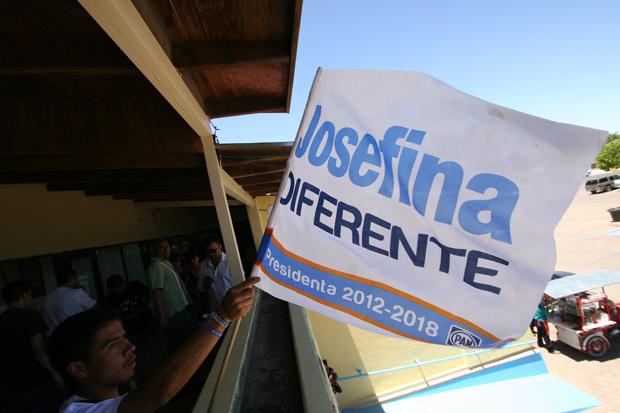Women Dominate Politics in Mexico Border City
A PAN campaign worker waves a flag in support of presidential candidate Josefina Vasquez Mota. (Photo: Michel Marizco)
By Peter O’Dowd
By now, Mexico’s political season is hot, like a scorching Mexican summer. Music plays from a dusty sedan that drives through the streets of Agua Prieta, a small town just south of Douglas, Arizona. It is sounding an anthem for the National Action Party — the PAN.
This is the first time Mexico’s conservative, Catholic party has had a woman candidate run for mayor of Agua Prieta. But Lolita Montaño is no political neophyte. She has already done stints in the state legislature and the city council.
“I’m a woman who wears skirts,” she said while witnessing a wedding and touring the offices of City Hall. “But I can wear the pants comfortably too.”
Like many other border cities in northern Mexico, Agua Prieta also suffers from an image problem. So Montaño’s said her priority is to restore the town’s reputation as a safe place for Americans to visit. But even as she campaigns in the town, Montaño is paying attention to another race. A woman from her PAN party is trying to become Mexico’s first female president.
“It’s not so much that men didn’t want women in politics. It’s that women up until now have never stood up and said: ‘I am here. Well, I am here,'” she said.
Montaño’s campaign manager Arturo Romero said he thinks it is the time for a woman to lead Agua Prieta and Mexico.
Romero and others suggest that Agua Prieta provides an example the rest of Mexico will soon follow. The town has already been run by a woman. Her name is Irma Terán and she is running for the job again this year, holding boisterous campaign rallies.
“Women in Mexico are making really, really significant strides,” said Erik Lee, who studies trans-border issues at Arizona State University.
Lee pointed to a handful of women who have already landed powerful positions in the country’s unions and government.
“The Mexican public has become accustomed to this very quickly,” he said.
In a way, they have had to. For the past decade, Mexico has had a quota system in place that requires 40 percent of a party’s candidates for federal offices to be women. But parties have struggled to comply and Mexico is lagging behind other Latin American countries that have already elected woman presidents. Still, Lee said Mexico is doing better than at least one of its neighbors.
“I have a running bet with some colleagues about whether the US or Mexico will have a woman president first,” Lee said. “My money is on Mexico.”
That landmark is unlikely to come this year. The PAN candidate, Josefina Vasquez Mota, is behind in the polls. Analysts say that’s not because she is a woman; anyone following the unpopular current president, Felipe Calderon, would have trouble. But, at the street level, there is still a perception by some that Mexico isn’t ready for a woman.
In Agua Prieta’s main plaza, shoe shiner Uriel Castillo took a break from watching TV to talk politics and said gender does make a difference.
“A woman can’t fight against drug traffickers and all that rebelliousness,” he said. “She could be threatened, and fearful, because she’s a woman.”
The 59-year-old Castillo said that is why he won’t vote for a woman president. But he said he is fine with a woman running Agua Prieta because the town is a relative oasis of calm along a turbulent, and violent border.
Our coverage reaches millions each week, but only a small fraction of listeners contribute to sustain our program. We still need 224 more people to donate $100 or $10/monthly to unlock our $67,000 match. Will you help us get there today?
